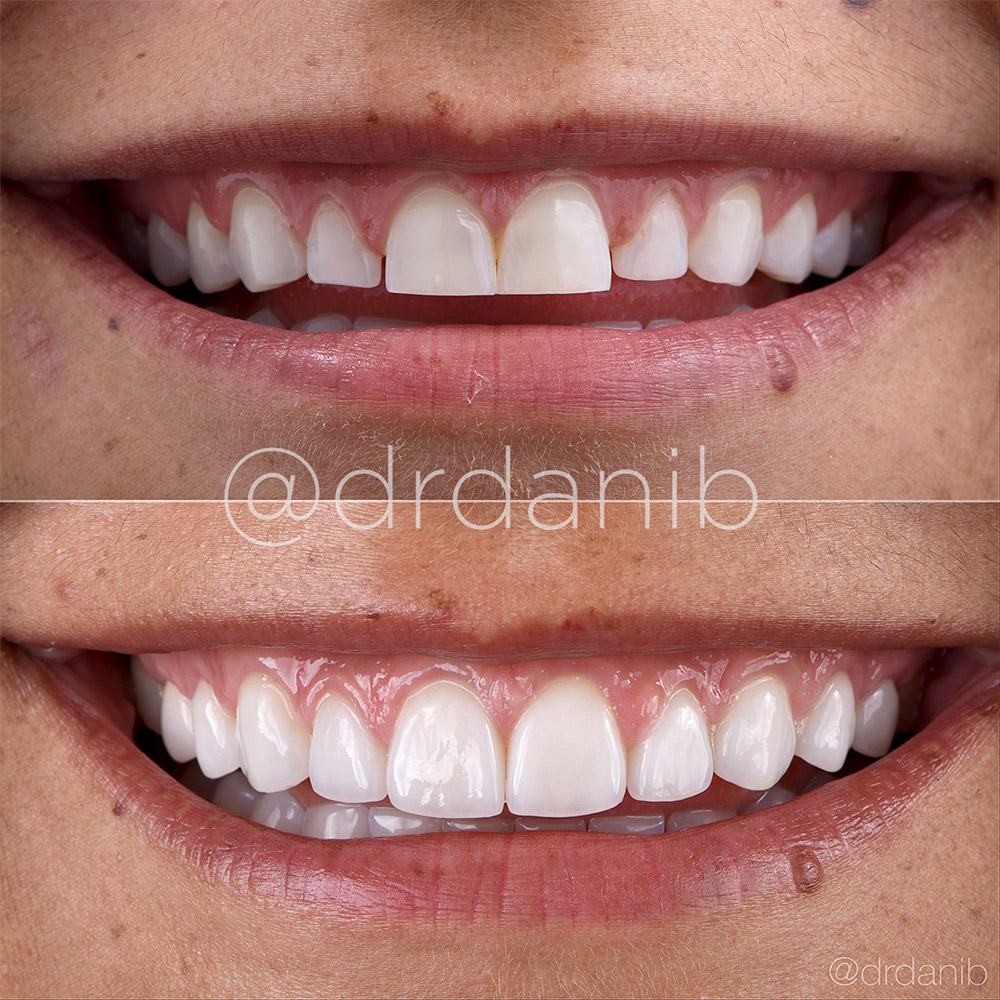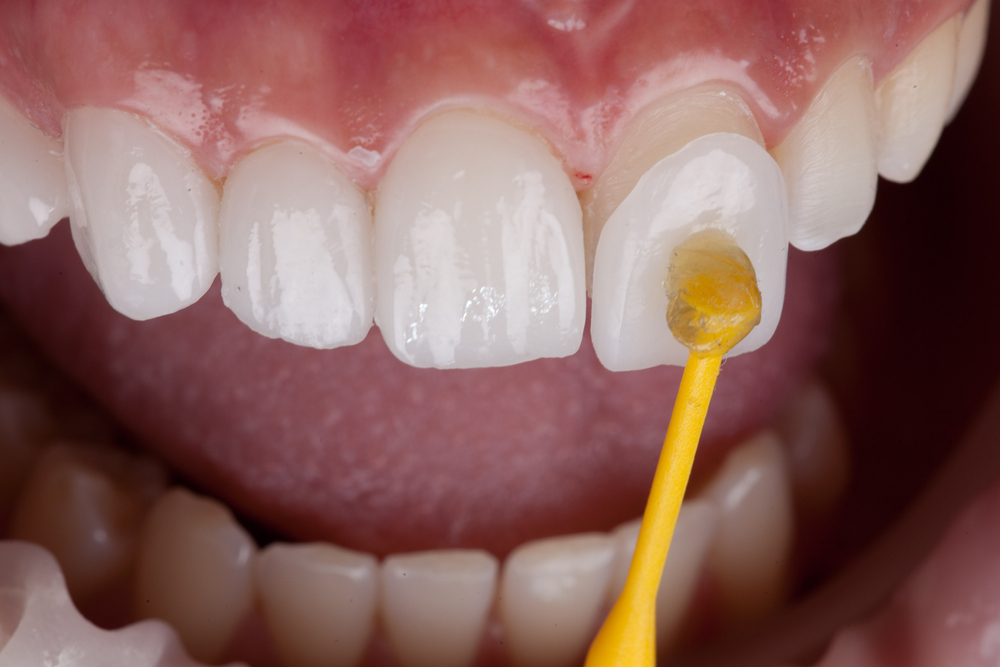The Full Overview of Veneers: Kinds, Utilizes, and Their Influence on Your Smile
Veneers act as a preferred option for people looking for to enhance their dental aesthetics. These custom-crafted coverings can properly mask imperfections such as staining and gaps. With two main kinds offered, porcelain and composite resin, each deals unique advantages and limitations. The influence of veneers expands past mere appearance, affecting self-worth and social communications. Understanding their advantages and types is crucial. What might this imply for one's general quality of life?
Recognizing Veneers: What They Are and Exactly how They Function
Veneers are slim coverings, normally made from porcelain or composite material, that are custom-crafted to fit over the front surface area of teeth. They serve both visual and functional functions, giving a service for numerous oral flaws such as staining, gaps, and minor imbalances. By sticking to the tooth enamel, veneers produce an all-natural appearance while boosting the shape and color of the teeth.
The procedure typically includes a preliminary consultation, where a dental professional analyzes the individual's requirements and goes over desired results - Porcelain Veneers Dentist. Following this, a marginal amount of enamel may be removed to suit the veneer. Impacts of the teeth are after that required to ensure a precise fit. When fabricated, the veneers are adhered firmly to the teeth using a special dental adhesive. This treatment not just boosts the smile's appearance however additionally aids secure the underlying teeth from further damage, making veneers a prominent choice for lots of looking for a smile makeover
Kinds of Veneers: Porcelain vs. Compound Resin
The difference between porcelain and composite resin veneers exists in their product make-up and attributes. Each kind offers differing levels of resilience, durability, and price, influencing individuals' choices based on their specific needs. Comprehending these distinctions is essential for making a notified decision regarding dental enhancements.
Material Distinctions Clarified
While both porcelain and composite material veneers offer the exact same cosmetic purpose, they vary greatly in material homes, sturdiness, and aesthetic results. Porcelain veneers are crafted from a ceramic product that resembles the all-natural translucence of teeth, giving a realistic look. Their smooth surface area is immune to staining, making them an appealing option for those looking for a durable visual. In comparison, composite resin veneers are made from a tooth-colored plastic material, using versatility and convenience of application. Nonetheless, they may not achieve the very same degree of brightness or clarity as porcelain. Additionally, composite veneers can be much more easily shaped and fixed, making them a much more versatile option in particular dental circumstances. Each kind offers special benefits tailored to private preferences.
Durability and Toughness
When comparing porcelain and composite resin veneers, durability and longevity are considerable variables. Porcelain veneers are known for their stamina, often long lasting 10 to 15 years with correct care. Their durability versus breaking and tarnishing makes them a popular option for individuals looking for long-lasting outcomes. On the other hand, composite material veneers normally have a much shorter lifespan, averaging 5 to 7 years. While they can be fixed extra easily if damaged, they are more prone to wear and discoloration over time. The selection in between these products usually relies on the person's way of living, aesthetic goals, and maintenance preferences. Eventually, understanding the distinctions in long life and longevity can assist clients in selecting the veneer type that ideal matches their requirements.
Price Contrast Insights
When picking between porcelain and composite material veneers, expense is an important factor to consider. Porcelain veneers generally vary from $800 to $2,500 per tooth, showing their resilience, aesthetic appeal, and resistance to staining. These veneers call for an extra comprehensive treatment and specialized laboratory job, adding to their higher price. On the other hand, composite resin veneers are generally more inexpensive, setting you back between $250 and $1,500 per tooth. They can be applied in a solitary go to, which reduces labor prices. However, composite veneers might need much more regular substitutes, possibly raising long-lasting costs. Inevitably, the option in between porcelain and composite resin veneers depends on individual spending plans and desired end results, balancing initial costs against long life and visual results.
The Benefits of Finding Veneers for Your Smile
Choosing veneers provides significant advantages for those seeking an enhanced smile. Their improved visual appeal can change the look of teeth, while their stain-resistant residential properties guarantee a long-term brightness - Dental Veneers. This combination makes veneers a preferred choice for individuals wanting to accomplish a perfect smile
Enhanced Visual Charm
Veneers frequently emerge as a preferred solution due to their transformative visual advantages when people seek to improve their smiles. These slim coverings, commonly made of porcelain or composite resin, can efficiently hide imperfections such as chips, voids, and misalignment. By simulating the all-natural look of teeth, veneers supply a seamless, radiant smile. Their customizable nature enables a customized strategy, allowing individuals to select tones and shapes that ideal fit their facial features. Furthermore, veneers can develop an uniform appearance, improving total face balance. This visual improvement not just boosts self-confidence yet can additionally positively influence social communications and individual relationships, making veneers a prominent choice for those looking to accomplish a brighter, more eye-catching smile.
Stain Resistance Benefits
Veneers not just enhance visual allure but also provide significant discolor resistance, making them an attractive choice for individuals concerned concerning keeping an intense smile. Made up of durable products such as porcelain or composite material, veneers are less permeable than natural teeth, which assists stop the absorption of stains from typical culprits like coffee, tea, and merlot. This intrinsic discolor resistance enables people to enjoy their favorite beverages without fretting about staining. What Are click to read more Veneers. Additionally, the smooth surface area of veneers makes them easier to clean, further boosting their longevity and preserving their immaculate look. Because of this, veneers give a functional service for those seeking both charm and functionality in their dental treatment
The Refine of Obtaining Veneers: What to Anticipate

Although the procedure of obtaining veneers might seem challenging, recognizing the actions involved can ease worries. A consultation with a dental practitioner is essential to determine if veneers are the suitable service for the individual's dental problems. Throughout this visit, the dentist will discuss wanted results and take perceptions of the teeth.
Next off, a 2nd visit is scheduled for tooth prep work, where a percentage of enamel is typically eliminated to accommodate the veneers. Short-term veneers might be positioned while the personalized ones are crafted in a dental lab, which normally takes a couple of weeks.
Once prepared, the dental practitioner will certainly put the veneers, making certain appropriate fit and shade before bonding them to the teeth utilizing an unique adhesive. After last modifications, the dentist will certainly offer assistance on care. Recognizing these steps can assist clients feel a lot more comfy and notified throughout the veneer process.
Upkeep and Care for Your Veneers
Maintaining veneers calls for consistent like ensure their longevity and look. Proper dental health is necessary; brushing twice daily with a non-abrasive toothpaste and flossing frequently help stop plaque buildup around the veneers. In addition, routine dental exams are important for checking the condition of the veneers and dealing with any kind of potential issues early on.
When biting to prevent damage, clients ought to stay clear of tough foods and excessive force. It's also suggested to restrict usage of discoloring compounds, such as coffee, tea, and merlot, as these can influence the veneers' shade gradually.

Changing Your Smile: Real-Life Effect of Veneers
A glowing smile can greatly improve one's self-confidence and total look. For several individuals, veneers work as a transformative service, properly dealing with various oral issues such as discoloration, gaps, and imbalance. These thin coverings, customized to fit over the front of the teeth, can develop a harmonious and cosmetically pleasing smile.
Real-life instances highlight the extensive influence veneers can have. Clients frequently report an immediate increase in self-esteem and social interactions following their treatment. The newfound confidence can result in even more possibilities in individual and professional life, as people feel even more inclined to next page engage and share themselves.
Furthermore, the psychological benefits extend beyond plain appearance; lots of experience boosted mental wellness as they accept their smiles. Veneers not just enhance physical attributes however likewise add greatly to total high quality of life, underscoring their worth in cosmetic dentistry.
Regularly Asked Questions
Just How Lengthy Do Veneers Usually Last Prior To Needing Substitute?
Veneers commonly last in between 10 to 15 years prior to needing replacement. Variables such as dental health, dental routines, and the sort of product used can affect their long life and general longevity. Routine dental examinations are recommended.
Can Veneers Be Gotten Rid Of, and if So, How?
Yes, veneers can be gotten rid of. A dental expert typically utilizes customized tools to meticulously separate them from the teeth, making sure very little damage to the underlying enamel, often complied with by necessary modifications or remediations for ideal aesthetic appeals.
Are Veneers Suitable for Every person's Dental Condition?

Will Getting Veneers Hurt or Require Anesthetic?
Obtaining veneers normally includes minimal discomfort, and many clients get regional anesthesia to guarantee a pain-free experience. Sensitivity may take place temporarily afterward, however most find the procedure tolerable and are satisfied with about his the results.
Just How Do Veneers Affect Tooth Sensitivity After Positioning?
Veneers can momentarily raise tooth sensitivity as a result of the elimination of enamel and the bonding process. The majority of people experience a decline in level of sensitivity with time as the teeth get used to the new veneers.
Veneers are thin shells, usually made from porcelain or composite resin, that are custom-crafted to fit over the front surface area of teeth. Porcelain veneers are crafted from a ceramic material that mimics the all-natural translucence of teeth, providing a natural look. Porcelain veneers usually vary from $800 to $2,500 per tooth, mirroring their toughness, aesthetic allure, and resistance to discoloration. In comparison, composite material veneers are generally more budget friendly, setting you back in between $250 and $1,500 per tooth. Made up of durable products such as porcelain or composite material, veneers are less permeable than natural teeth, which helps prevent the absorption of spots from common perpetrators like coffee, tea, and red wine.